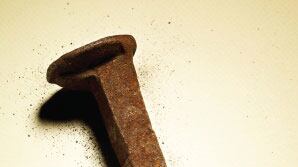Plus: Check out Book Beast, for more news on hot titles, authors and excerpts from the latest books.

Titling your debut novel “American”-anything takes nerve. There’s American Pastoral to contend with, An American Tragedy, Americana, U.S.A., An American Dream, a long line of Very Important Novels likely to outclass your own. So who does Philipp Meyer think he is? The jacket of American Rust (Spiegel & Grau, $24.95) tells us he’s a high-school dropout with a Cornell degree and stories published in McSweeney’s and The Iowa Review. On his website you’ll learn he has an MFA and that his influences are Joyce, Faulkner, Woolf, and Hemingway. Uh oh.
Except American Rust earns the grandiosity of its title, and is no insult to Meyer’s Big Four. This is a crime story set in a Pennsylvania steel town that feels deep, rich, even Important in its timely portrait of hard-luck America. Last month, the New York Times noted that Patricia Cornwell had given Meyer’s novel a dream plug by slipping American Rust into the hands of a cop guarding a crime scene in her latest bestseller Scarpetta. A cynic might dwell on the fact that the two authors share an agent, but Cornwell hardly needs to curry anyone’s favor, so let’s take her at her word: Meyer, she’s said, should win a Pulitzer.
American Rust combines the muscular pleasures of a Dennis Lehane thriller with a far-reaching meditation about where we’re headed as a country.
Well, maybe he should. American Rust combines the muscular pleasures of a Dennis Lehane thriller with a far-reaching meditation about where we’re headed as a country. It’s a novel about loyalty and friendship, but the setting leaves such a harrowing impression—a Monongahela River Valley so economically blighted as to feel post-apocalyptic—that calling it a novel about friendship is like saying Cormac McCarthy’s The Road is about paternal love.
And yet, amid the shuttered mills and trash-laden streets, the hopelessness of layoffs and foreclosures, a need for human connection endures. So when brainy, 20-year-old Isaac English flees home with $4,000 stolen from his dad, his sights set on riding the rails to California, it is his best friend he turns to for company. That would be Billy Poe, an ex-football star, 21, out of work, and a bit of a hothead. Poe is not up for California, but he’ll walk with Isaac a little way out of town. In the rain they take shelter in an abandoned manufacturing plant and encounter a group of drifters looking for trouble. Isaac’s instinct is to run; Billy wants to stay and fight. A man is killed, but who’s to blame? And will either Isaac or Billy let the other take the fall?
These questions snare the young men’s families, as well as the local police investigator, Bud Harris, a loner who lives in a remote cabin with a malamute and Zoloft to keep him company. Harris is memorably drawn, as are Billy’s unhappy mother, Grace, and Isaac’s beautiful, selfish sister Lee. All are forced to take sides, and when Billy is carted off to a dangerous prison, they have to make hard choices about how to save him.
The prison scenes, written from Billy’s perspective, show Meyer at his propulsive, frightening best. But Meyer has a slightly more mannered, literary side as well. In the chapters that follow Isaac as he hops a coal train out of town, hobo-ing it as far as Michigan, Meyer opts for stream-of-consciousness narration. Here, for instance, is Isaac cleaning himself up in a diner bathroom: “Now the cold towelwash, way to clean a corpse. Body’s last bath. Special attention to crevices—probably they use a hose now, drip dry, automatic wash for bulk processing. Who knows who touches you after you’re dead?” We get it—Isaac is a little unhinged, haunted by the suicide of his mother—but the rest of the novel is written in such a natural, unaffected style that these Joycean flourishes feel distractingly self-conscious.
Never mind; it’s a quibble. American Rust yanks you along right till the end and its stark vision of national decline sticks with you for days. Billy isn’t college-bound like his friend Isaac, but he’s wise enough to see what’s happening to the country, to blue-collar guys like him: “The work was all in the Midwest now, taking down the auto plants in Michigan and Indiana. And one day even that work would end, and there would be no record, nothing left standing, to show that anything had ever been built in America. It was going to cause big problems, he didn’t know how but he felt it. You could not have a country, not this big, that didn’t make things for itself. There would be ramifications, eventually.” What becomes of America when it leaves its working class behind? Billy’s dark vision reads—alas—like prophecy.

American Rust By Philipp Meyer 384 pages. Spiegel & Grau. $24.95 American Rust
Taylor Antrim is the author of the novel The Headmaster Ritual.





